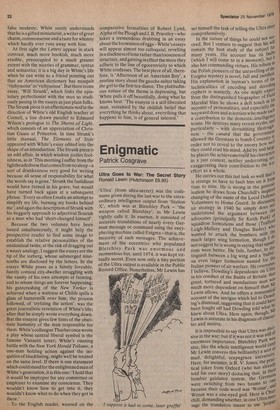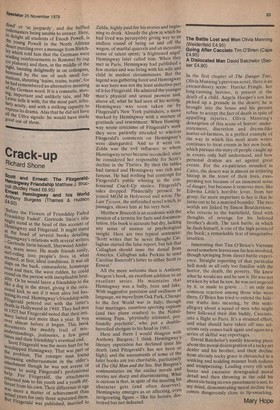Enigmatic
Patrick Cosg rave
Ultra Goes to War: The Secret Story Ronald Lewin (Hutchinson £6.95) 'Ultra' (from ultra-secret) was the codename given during the last. war to the extraordinary intelligence output from 'Station X', which was at Bletchley Park — 'the weapon called Bletchley', as Mr Lewin rightly calls it. In essence, it consisted of accurate translations of nearly every German message or command using the encyphering machine called Enigma — that is, the majority of such messages. The achievement of the eccentrics who populated Bletchley Park was enormous and momentous but, until 1974, it was kept virtually secret. Even now only a tiny portion of the Ultra output is available in the Public Record Office. Nonetheless, Mr Lewin has set himself the task of telling the Ultra stun' comprehensively. In the nature of things he could not su,,,e" ceed. But I venture to suggest that his viw remain the best study of the subject for many years. His account has its fault:, (which I will come to in a moment), hut also has commanding virtues. His tribute t° the Polish pioneers of the unravelling of the Enigma mystery is novel, full and justified. His explanation in layman's terms of the technicalities of encoding and decodingt cyphers is masterly. As one might exPe,e, from the distinguished biographer of Fie',u Marshal Slim he shows a deft touch iiihulps account of personalities, and especiallY wayward dons and scientists who made sue' a contribution to the domestic.intelligene,e teams. He destroys many recent myths, an' particularly — with devastating thorough; ness — the canard that the governMeg allowed the Germans to bomb CoventrY order not to reveal to the enemy how we' they could read his mind. And by and leg he places the achievements of his characters in a just context, neither underrating exaggerating their contribution to the war effort as a whole. He carries out this last task so well thatl is strange to have to fault him on it froir time to time. He is wrong in the generaci isation he draws from Churchill's inspire changing of the name of the Local Defer', c,„c Volunteers to Home Guard. In discussillet air strategy in 1940 he simply does 01, understand the argument between II advocates (principally Sir Keith Park) it)d squadron formations and those (Tt, Leigh-Mallory and Douglas Bader) wanted to attack the bombers with Or much larger wing formation, though I not suggest he is wrong in saying that All rons were better. He fails, further, to uls: tinguish between a big wing and a talb°,,; an even larger formation named for 0' Italian pioneer of air warfare. He over1ate5. I believe, Dowding's dependence on Vitrat in his conduct of the Battle of Britain: thas great, tortured and mendacious man ttar much more dependent on himself than .11 Lewin allows. And he offers a nonscusi'l account of the intrigue which led to DoW",, ing's dismissal, suggesting that it could hay' been fought off had Dowding told what le knew about Ultra. Here again, though, Lewin is accurate in his diagnosis of character and motive. It is impossible to say that Ultra was dee_ii sive in the war: but if it was not it was still us enormous importance. Bletchley Park wad also, like the whole intelligence world (anof Mr Lewin conveys this brilliantly) a sof! mad, delightful, scapegrace universitYc: Here, for instance, is R. V. Jones, the Pile., tical joker from Oxford (who has alrea told his own story) deducing that, in °lens bomber guidance system, the were switching from two beams to oricl because their code word was 'Wotan ,tri, Wotan was a one-eyed god. Here is Clitis, chill, demanding whether, in one Ultra 1fleat. sage the translators meant to use `le'pr) dised' or 'in jeopardy', and the baffled codernasters being unable to answer. Here, to delight all students of Enoch Powell, is ,the Young Powell in the North African iuesert puzzling over a message from BletchleY which told him that the Germans were sending reinforcements to Rommel by zug (or platoon) and then, in the middle of the rught, bursting delightedly in on colleagues, bemused by the use of such small form, ations, shouting 'trains, trains, trains', for Ile had remembered an alternative meaning .of the German word. It is a romantic, mov,Ing, important and unlikely tale, and Mr !-ewin tells it with, for the most part, scholarly acuity, and with a striking capacity to express its drama. Alas that he did not have all the Ultra signals: he would have made good use of them.



































 Previous page
Previous page